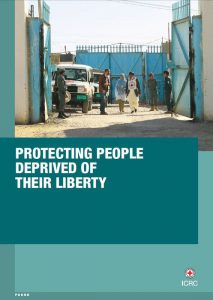International law stipulates that detaining authorities must ensure that any detainees under their jurisdiction are treated humanely, i.e. with the respect due to their inherent dignity and value as human beings. This obligation could be seen simply to entail the preservation of life and health, but in fact humane treatment requires much more than that.
The ICRC’s role is to ensure that detainees’ dignity and physical integrity are respected, that they are treated in accordance with international humanitarian law and other applicable laws and standards and, whenever necessary, to help detaining authorities fulfil their obligations.
We work to prevent and put an end to violations of humanitarian law and other applicable laws, and seek to resolve other detention issues of humanitarian concern. We do so from the time of arrest or capture until release, and in certain cases until the consequences of imprisonment have significantly diminished after release.
We focus on
- Ending and preventing summary executions and forced disappearances;
- Ending and preventing torture and other forms of ill-treatment;
- Ensuring that the living conditions in detention are decent and ensuring the physical and psychological integrity of detainees, in particular by guaranteeing access to food, drinking water, space, shelter and adequate health care and hygiene in a safe environment;
- Restoring and maintaining links between detainees and their relatives and promoting the maximum possible contact between them throughout the period of detention;
- Ensuring that detainees may exercise their rights and enjoy due process of law, including the judicial guarantees and procedural safeguards designed to prevent arbitrary detention;
- Contributing to the rehabilitation of released detainees (this most frequently involves addressing medical or psychological issues arising from ill‑treatment and overcoming practical challenges faced in reintegrating fully into their communities).
Progressively evolving role and activities
Prompted by deep concern about their situation, we started visiting prisoners of war in the First World War. We did so on our own initiative, but with the consent of the warring parties. The ICRC’s objective was to encourage them to improve the prisoners’ living conditions and to enable the prisoners to tell their families how they were.
Visiting prisoners and sending personal information were later developed and codified in international humanitarian law in the 1929 and 1949 Geneva Conventions and their 1977 Additional Protocols. The ICRC’s detention-related activities have progressively evolved from a monitoring role during armed conflicts to a broader range of activities that seek to help individuals deprived of their liberty in a variety of situations and places of detention.
Download our publication Protecting People Deprived of Their Liberty to learn more about the many aspects of our work in detention facilities around the world.



